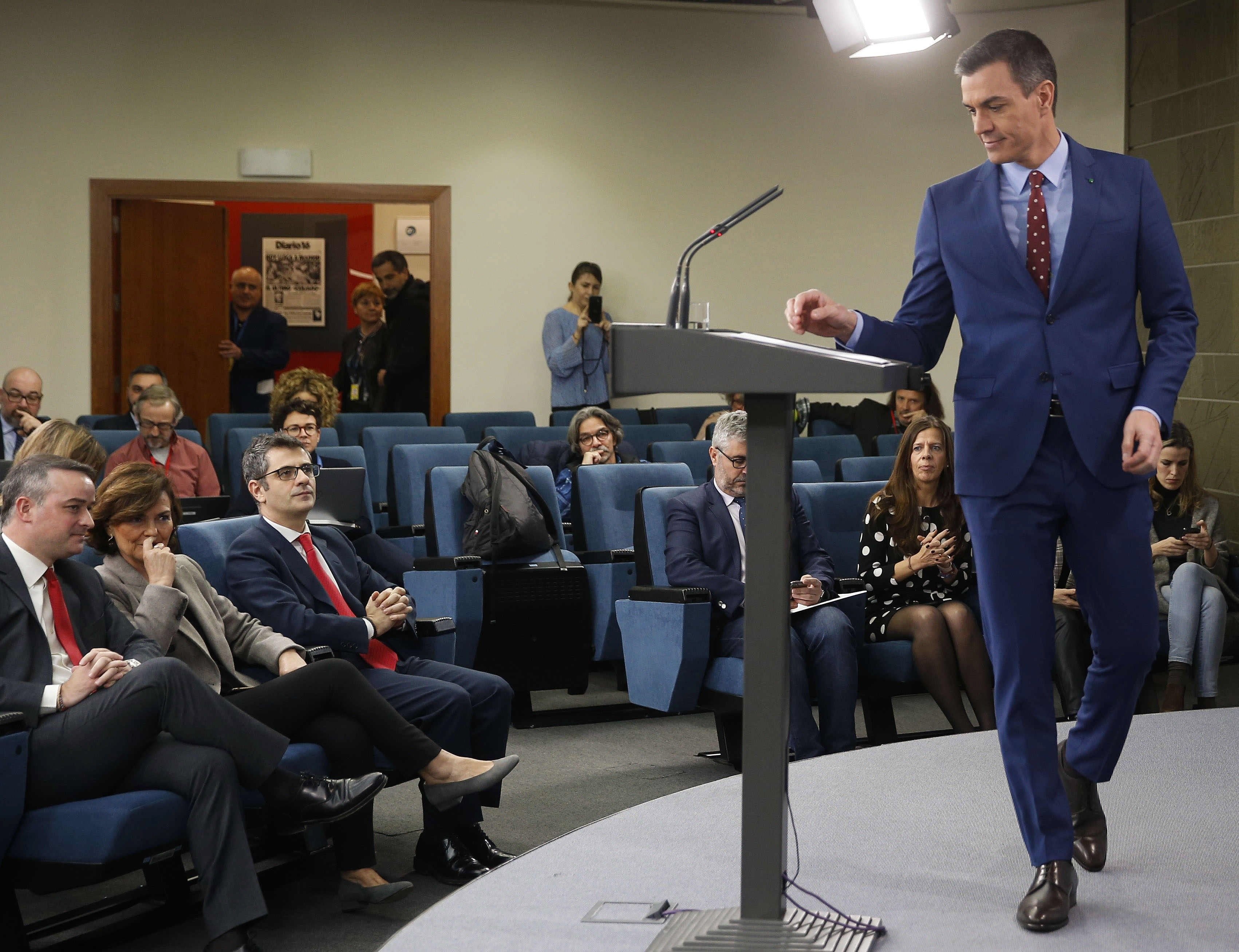Despite the setbacks the Catalan president has received from Spain's Central Electoral Commission and Supreme Court in recent days, for the moment the Spanish government considers that the person it has to talk to in Catalonia is Quim Torra. Pedro Sánchez said so himself in an informal conversation with journalists this Sunday, emphasizing that he and Torra have a meeting pending. This meeting will be separate from the round of meetings which the Spanish PM-elect is to have with regional presidents, and it could even take place before this round and before the new Catalonia-Spain negotiation table is constituted. It's still to be decided whether this encounter between the prime minister and the president will take place in Madrid or in Barcelona.
In that regard, Pedro Sánchez emphasized that after last Thursday's phone call with Catalonia's president, the only thing now required to allow them to meet was to find a suitable time in their agendas. Regarding the threat that Torra's disqualification from holding public office might be executed imminently, he responded that this would "have to be decided by justice". However, he expects that the Catalan leader's status will not be clarified for some time. Before that, the negotiating table between the Spanish state and the Generalitat of Catalonia will have been set up.
The Spanish Socialist (PSOE) leader stressed that "territorial politics is not only Catalonia," and that several departments will be responsible for this, from himself and deputy PM Carmen Calvo to the new justice minister, Juan Carlos Campo. He also praised the choice of the Catalan Socialists' organization secretary, Salvador Illa, as new health minister. A figure who, according to Sanchez, will play a role far beyond his formal portfolio: as a member of the executive he could take part in the Spain-Catalonia negotiation table.
In his brief appearance at the Moncloa palace, without taking questions, the new prime minister took the opportunity to formally announce the already-known 22 names of the ministers in his new cabinet. He has defended parity - 11 men and 11 women, with four deputy PMs - as well as stating that "this will be the legislature of dialogue". A dialogue that he has said will be "social, territorial and generational." In this respect, he stated that "the citizens are demanding a Spain of moderation and not one of tension".
The chosen 22
The Socialist leadership's drip-feed communication style in recent days has meant that everything was already public. Although the PSOE initially stated that the new cabinet would not be announced until this coming week, the composition of the Spanish coalition government began to filter out from last Thursday onwards. For 72 hours, the dynamic has been the same: first, details were leaked to a very limited number of media - those editorially sympathetic to the Socialists - and less than half an hour later came the official confirmation from the government's communications department. So much so, that in this Sunday's institutional statement to announce the 22 names of his new coalition cabinet, Sanchez had no-one new to announce. Of course, Sánchez's appearance was also timed to synchronize with the opening of the midday news programmes.
Thus, his cabinet, the largest Spain has had since the 1970s, has been confirmed. There will be four deputy prime ministers, each with their areas of responsibility: Carmen Calvo (responsible for the PM's department, relations with parliament and democratic memory), Pablo Iglesias (social rights and agenda 2030), Nadia Calviño (economy) and Teresa Ribera (ecological transition and agenda 2030). Eight ministers from the previous government are to repeat roles: María Jesús Montero (finance and government spokesperson), José Luis Ábalos (transport and urban agenda), Fernando Grande-Marlaska (interior), Margarita Robles (defence), Reyes Maroto (industry), Pedro Duque (science), Luis Planas (agriculture) and Isabel Celaá (education).
Apart from Iglesias, there are ten new cabinet members. Four, from coalition partner Unidas Podemos: Irene Montero (equality), Yolanda Díaz (labour), Manuel Castells (universities) and Alberto Garzón (consumer affairs). The other six, chosen by the Socialists: Salvador Illa (health), Arancha González Laya (foreign affairs), José Luis Escrivá (social security), Carolina Darias (territorial), Juan Carlos Campo (justice) and José Manuel Rodríguez Uribes (culture and sport).
As Sanchez explained to reporters, no-one who was offered a ministerial role turned it down and all the names were clear from the outset. He underlined the proven "professionalism" of the new executive, and reiterated that the new coalition executive would have input from "plural ideas" but would "walk in a single direction". There would, he said, be "different voices but speaking with one word".
Tuesday, first cabinet meeting
Members of the cabinet, having been announced, will be sworn in to their posts before king Felipe on Monday morning. It will be a day of transfer of portfolios. The new cabinet will meet this Tuesday, this time with a press conference by Pedro Sánchez. The executive is expected to meet again on Friday, its usual day.

